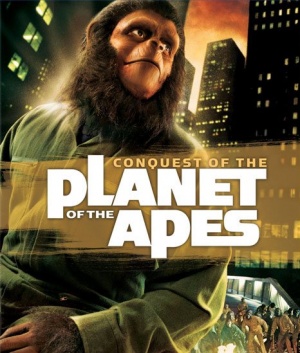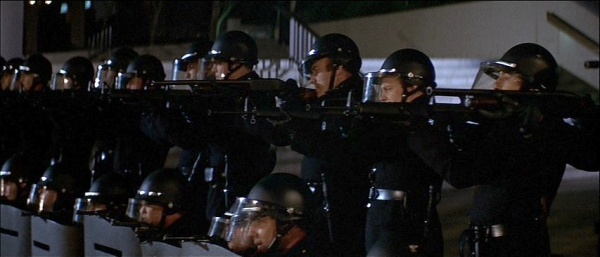The Planet of the Apes Retrospective
These Apes Are Revolting...
Of all the films in the Planet of the Apes franchise, the fourth, Conquest of Planet of the Apes, may be the darkest. As in most of the Ape films, we have allegory to the times it was released in. However, the social commentary appears to veer dangerously close to calling for violent militancy in overcoming oppression.
It is North America 1991. The country has become a police state with military police patrolling the city, making sure the apes do not gather in large groups. All dogs and cats have died off, and apes (chimpanzees, gorillas, orangutans) began as pets, but by the time of Conquest of Planet of the Apes, they are slaves. The human population treats them poorly and the 'masters' hold themselves to be superior while the apes do menial work and carry their purchases, but treat them brutally, abusing them at every opportunity.
Into this world enters circus owner Armando (Ricardo Montalban) along with his chimp (Roddy McDowall). They are there to promote Armando's circus, but it is the first time this particular chimp has ever ventured into this strange new world. He is appalled at how inhumane the apes are treated. One act of excessive brutality is too much for him, and he does what he should not have: he speaks. Armando tries to bluff his way out of the situation by saying it was he, not his ape, that spoke. However, he isn't believed and is taken into custody. In the confusion, the chimp escapes.
However, the chimp finds himself as part of a new shipment of apes to be sold at auction. After quick training of the fine arts of serving man, he is bought by none other than the Governor (Don Murray), head of Ape Management. When brought to Governor Breck, the chimp picks his own name: Caesar. Breck suspects that Armando has the legendary talking ape, son of intelligent apes from the future who were killed (all this is chronicled in Escape From Planet of the Apes). While it was believed that their child was also killed, no one was ever certain. Breck is certain that this legendary 'talking ape' will lead a revolution against humanity (the simian version of Nat Turner or Toussaint L'Ouverture, if you will).
Therefore, all efforts must be made to find him if he exists and kill him. However, the Governor does not know where this mysterious ape is, and Armando is still being vague in his answers. When he is placed in the Authenticator (a Truth Machine), rather than confess all, Armando dies (though it's not clear if he jumped or accidentally was pushed out the window). Upon learning of Armando's death, Caesar loses faith in all humanity and plots revolution.
He soon secretly encourages the apes in civil disobedience (a Chimp Guevara, if you will). Soon, the apes, under Caesar's watchful eye, start committing small acts of defiance against the humans. They also start collecting weapons. Breck and his Chief Aide MacDonald (Hari Rhodes) suspect something is going on but have no definitive proof. Caesar may have found love with ape Lisa (Natalie Trundy) but a revolutionary's activities trump romance. Breck, outraged at the reports of misbehaving apes, orders that brute force be used to stomp out all signs of disobedience against MacDonald's advice to show restraint (he knows that a fierce response will only aggravate the situation).
Eventually, MacDonald comes to realize Caesar is the talking ape, but he cannot turn him over to the Governor's thuggish police (MacDonald, who is black, knows about the high cost of slavery). Caesar is taken and tortured into speaking. Breck orders him killed, but MacDonald disables the machine, allowing Caesar to fake his death. Now, he leads the apes in a violent uprising which overwhelms Ape Management. In the cataclysmic conclusion, Caesar, now head of the revolt, declares that this action will be seen and imitated by apes around the world, and that it is the beginning of the end for humanity and out of this will rise...a Planet of Apes.
Conquest of Planet of the Apes has at its heart a brilliant idea, but the execution leaves a lot to be desired. Chief among its flaws is the fact that the lower budget for the film is obvious. Most of the action takes place in the same location (which looks like an office complex with a central plaza), so there's always a sense that it was done on the cheap. Also, the script by Paul Dehn (who wrote either the screenplay or the story for all the Ape films save the first) leaves some questions unanswered.
For example, how and why did the other apes start obeying Caesar's silent guidance to defy their masters? We never see Caesar interact with a group of apes except when they bring weapons (most good, some useless) to a secret lair. Second, with the fall of Ape Management, we never know how Caesar got all the apes to join in this Simian Liberation Army. The romance between Caesar and Lisa is short-changed because we never see a romantic situation. Instead, we only get hints of it.
One big problem Conquest of Planet of the Apes has is its ending. Originally, it was going to be more violent, with Caesar calling for the virtual extermination of humanity and mass killing. However, the final product has an odd ending, where Caesar basically pulls back from taking the full force of the violent revolution and instead leaving the humans alive but with a warning that their time of full domination is coming to an end: either share the planet or face annihilation.
The ending, as I understand it, was reworked because some test audiences reacted negatively to the orgy of violence the Simian Uprising unleashed. However, this is where Dehn and director J. Lee Thompson should have either stayed true to their vision or have not written the ending as they had. Having Caesar turn, if not peaceful at least less filled with vengeance, strikes a false note. It also is obvious that the ending was altered: if one listens carefully to Caesar's final speech, you can tell the audio is different when expressing an ability to "be humane to humanity" versus when he speaks about mankind's ultimate downfall. Also, the viewer will note that we never see Caesar give the second part of the speech. Instead, we just see him from afar or just his eyes. Both clearly show that the lines were redubbed to fit the new conclusion as opposed to being part of the story.
If the secondary story of Lisa and Caesar had been given more prominence, we could have seen her character be a moderating influence on his radicalism, even to where she makes the case that the apes should not behave so beastly (no pun intended). However, for whatever reason the production team opted not to do so, and Conquest of Planet of the Apes suffered because of it.
One thing that is important is how in Conquest of Planet of the Apes we see the importance of race. MacDonald being black is highly important: beyond the fact that he is the only sympathetic human character (apart from the Hispanic Armando), as an African-American he is more conscious than all the others about the brutality of slavery. It is clear that the apes have gone beyond being pets and are now used as labor, but who are brutalized by the humans.
At one point, MacDonald and Breck discuss how an ape had killed his "master" (using that very word), but the Governor responds that the ape "deserved it" even with evidence that the ape had been brutalized. Curiously, this train of thought about apes being enslaved and the immorality of slavery was not pursued in the film. It might be my imagination, but I kept seeing hints of apartheid in the film in regards to how the humans (almost exclusively white) treated the apes with contempt and thought nothing of denying them even the simplest dignity. It is when we treat 'the other' as non-human that an oppressed group may react with violence as a way to redress their grievances: a message still relevant today.
The performances still continue being strong. McDowall shows his evolution (no pun intended) from a naïve chimp to a violent revolutionary, and with just a look he inspires other apes to disobey their masters. Rhodes' MacDonald was at heart a good man who appeared troubled by what the apes are going through and ultimately helps Caesar and ends up asking him for mercy. Murray is a frightful figure as Governor Breck, one who is determined to keep the apes down at all costs (side note: he does remind me of Bashir Al-Assad, whom I call Monkey-Boy because of his ears and his brain. Both are uncaring monsters who would kill all who oppose their right to rule as they wish, but now I digress). Montalban again has a small role as Armando, but in his few scenes he captures the fear he has of having his friend's true identity discovered (though again, his end shows just how limited the budget was).
It's a curious thing: Conquest of Planet of the Apes, at a mere 88 minutes, is the shortest of the Ape films but it is the one that would have benefited tremendously by being longer. Scenes jump from one point to another with very little connecting them. If we had been allowed to know the characters or how they related to each other (say, how the apes came to trust Caesar to be their leader), Conquest of Planet of the Apes would have come close to being a strong picture. As it stands, the film is entertaining, but too short and frankly too cheap-looking to be among the best of the Ape films.
Here is where Conquest of Planet of the Apes maintains its topical nature, a hallmark of almost all the Ape films. In 1972, the fears would come from groups like the Black Panthers or the various Liberation Armies or the Weather Underground: groups that either called for or were perceived to call for violence to achieve their goals. The fears of an uprising in America have settled down, but the film still addresses how violence is used to make change if no other recourse is allowed. In the final analysis, Conquest of Planet of the Apes could have been great, but it is only above average, still worth your time but not as revolutionary as it could have been.
DECISION: C+
Next Planet of the Apes Film: Battle for Planet of the Apes





No comments:
Post a Comment
Views are always welcome, but I would ask that no vulgarity be used. Any posts that contain foul language or are bigoted in any way will not be posted.
Thank you.